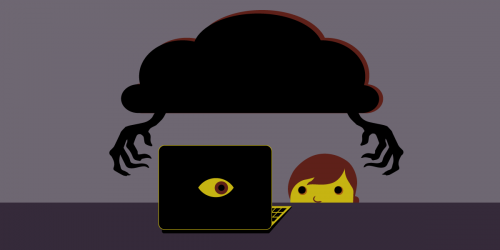As students were sent home from school in the spring due to the coronavirus pandemic, schools followed them home with invasive surveillance technology. This trend, spurred by the surge in remote learning, was an opportunistic move by tech companies and schools already in a race to control students through technology.
With millions of students studying from home to stay safe from COVID-19, new threats have popped up.
The Student Surveillance Ecosystem Pre-Pandemic
Before the pandemic, the school panopticon toolkit was already wide-ranging. Many schools relied on cameras and microphones installed in buildings to watch students go about their day. The cameras might be equipped with facial recognition; the microphones might have “aggression detection” capabilities. Facial recognition is a biased technology, and cities have started banning government use of face surveillance because of this issue. Aggression detection technology simply doesn’t work.
Some software scans students’ social media posts, both during and after school hours. Schools can even track students’ personal devices (as opposed to school-issued), by requiring the use of a certain kind of security certificate to use the school Internet, thus giving administrators the ability to monitor browser history and messages students send. These technologies cause real harm, including disproportionately impacting students of color and causing mental health issues. And knowing they might be punished for speaking up— like the Georgia student suspended for posting about inadequate coronavirus mitigation measures—is inherently chilling to students’ freedom of expression.
In response to this encroachment of surveillance into schools, EFF created a Surveillance Self-Defense Guide written especially for students. It describes the technologies that students can be subject to, the risks they pose, and how to minimize those risks—and how to make the case to parents, teachers, and school administrators that spy tech doesn’t belong in a place of learning.
This was already an Orwellian situation before the pandemic. Now, with millions of students studying from home to stay safe from COVID-19, new threats have popped up.
The Turbocharging of Remote Proctoring
Remote proctoring refers to a class of monitoring technology that spies on students as they complete exams. It is incredibly invasive, often uses facial recognition software and AI monitoring, collects massive amounts of sensitive data (including in some cases biometric information), and scrutinizes students every facial expression and movement for signs of academic dishonesty. Proctoring software can also have biases against students that do not fit the presumed white, neurotypical, and able-bodied "norm," further exposing the most vulnerable students to harm. Ultimately, these apps cannot keep their promise to stop cheating. Students will always be able to undermine these tools, making this technology merely a further normalization of surveillance in education.
These apps subject students to unnecessary and invasive surveillance, and EFF has been proud to stand with students on this issue. We’ve objected to the California Bar’s required use of ExamSoft in the bar exam and won a partial victory when–shortly after receiving our letter–the Clerk and Executive Officer of the California Supreme Court asked the state bar to propose a timetable within 60 days for the deletion of all the 2020 bar applicants’ personally identifiable information collected via ExamSoft. When ExamSoft flagged over a third of all online test-takers, we pushed for the Bar to give examinees additional time and information necessary to defend themselves against the many likely baseless accusations of cheating. And when five U.S. senators began investigating these apps, we reminded them that the entire business model of proctoring companies is surveillance of students, and that you can’t make spying less invasive.
University App Mandates
Some universities have mandated that students install COVID-19-related technology on their personal devices as a condition for returning to campus or enrolling in classes. EFF has been clear that this is the wrong call. Exposure notification apps, quarantine enforcement programs, and similar new technologies are untested and unproven, and mandating them risks exacerbating existing inequalities in access to technology and education. Schools must remove any such mandates from student agreements or commitments, and further should pledge not to mandate installation of any technology. EFF is urging universities to rethink these mandates and commit to our University App Mandate Pledge: six transparency and privacy-enhancing policies that university officials must adopt to protect the privacy, security, and transparency of their community members. Students, staff, faculty, and university community members can speak up here.
EFF will continue to stand for student privacy. Whether it’s creating resources like our Privacy for Students guide, continuing to write about emerging student privacy issues, or teaching journalism graduate students how to think and write about data privacy issues that affect students, we’ll be here to fight for and reassure students: invasive surveillance is not normal and it has no place in your school.
This article is part of our Year in Review series. Read other articles about the fight for digital rights in 2020.













